Do not provide any information on USPS Rewards scam pages
Phishing/ScamAlso Known As: USPS Rewards delivery confirmation scam
Get free scan and check if your device is infected.
Remove it nowTo use full-featured product, you have to purchase a license for Combo Cleaner. Seven days free trial available. Combo Cleaner is owned and operated by RCS LT, the parent company of PCRisk.com.
What is USPS Rewards scam?
USPS Rewards scam is a scam created with the purpose to trick users into believing that they have a chance to get a reward in return for participation in a survey and entering personal information on a number of websites. It is known that one of the channels that scammers use to promote this scam is email.
They send emails pretending to be from USPS with a website link that opens a scam page, which leads to other different scams (pages asking to provide personal information).
Although, it is possible that the same website promoted through email may be promoted via deceptive advertisements, other shady pages, potentially unwanted applications (PUAs) as well.
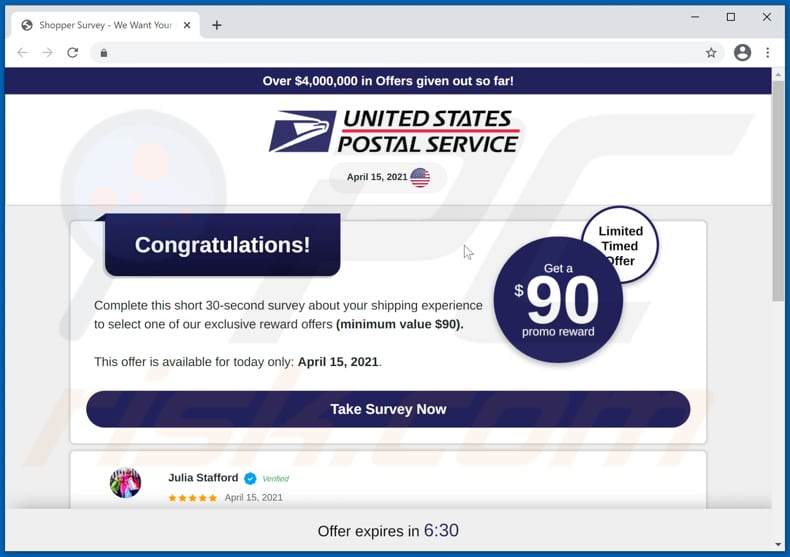
USPS Rewards scam overview
As scammers claim in their email, recipients have to confirm/activate some delivery by clicking the "Click here to continue the Delivery". Their email does not contain any more detailed information, just a fake customer number.
The button (hyperlink) in that email opens a fake USPS website claiming that visitors can get a $90 (or bigger) promo reward in exchange for taking a survey. Once a survey is completed, this deceptive website offers to choose one of the offered rewards.
Each offer has the "CLAIM REWARD" button, all of them open deceptive websites that ask visitors to provide details such as first and last name, address, ZIP code, city, state, phone number, and email address so they could receive their reward.
It is common that after providing basic information, visitors are asked to provide more personal information such as credit card details, bank account numbers, or to pay a "processing", "transaction," or another fee.
In other words, scammers behind scams emails/websites like these attempt to extract personal information or money from unsuspecting users. Nobody ever receives any prizes, rewards from these websites.
Best case scenario - users who fall for these scams end up in databases used to send spam via email, text messages. In one way or another, scam emails and websites like this one have to be ignored. If a browser opens such pages automatically and does it regularly, then it is likely that it has some PUA installed on it.
PUAs can be designed to generate advertisements and collect various data. It is common that PUAs display coupons, banners, surveys, pop-up ads, other ads used to promote shady websites or distribute unwanted apps by causing unwanted downloads or even installations.
Although, those ads cause unwanted downloads or installations only if they are designed to run certain scripts and users click on them. Some examples of details that PUAs collect are IP addresses, entered search queries, addresses of visited websites, geolocations.
In some cases, PUAs target sensitive data such as passwords, credit card details, and other sensitive data. Therefore, it is strongly advised not to have any apps of this type installed on a browser or computer.
| Name | USPS Rewards delivery confirmation scam |
| Threat Type | Phishing, Scam, Social Engineering, Fraud |
| Fake Claim | Visitors can receive exclusive reward offers in exchange for taking a survey |
| Disguise | USPS Rewards program |
| Related Domain | includingfuture[.]com |
| Symptoms | Suspicious bank account activities, spam attacks |
| Distribution methods | Scam emails, Compromised websites, rogue online pop-up ads, potentially unwanted applications. |
| Damage | Loss of sensitive private information, monetary loss, identity theft, possible malware infections. |
| Malware Removal (Windows) |
To eliminate possible malware infections, scan your computer with legitimate antivirus software. Our security researchers recommend using Combo Cleaner. Download Combo CleanerTo use full-featured product, you have to purchase a license for Combo Cleaner. 7 days free trial available. Combo Cleaner is owned and operated by RCS LT, the parent company of PCRisk.com. |
Online scams in general
There are many scam websites encouraging visitors to participate in fake lotteries, take surveys, etc. A couple of examples of similar pages are "Chance To Win The Brand New Playstation 5", "Google Membership Rewards", and "You've Made The 9.68-Billionth Search".
As mentioned in the second paragraph, there are no real prizes, winners, etc. These scams are designed to trick unsuspecting visitors into believing that they will receive some prize, reward in exchange for some information.
It is common that such scams are designed to look like they are coming from legitimate companies, organizations or other entities. Although, none of the legitimate companies have anything to do with these scams.
How did potentially unwanted applications install on my computer?
It is common for potentially unwanted applications to be distributed by including them in downloaders or installers of other programs. In other words, by bundling PUAs with other programs.
When users download and install programs that are bundled with PUAs without changing "Custom," "Advanced", or other settings (or unticking certain checkboxes), they agree to download or install those PUAs apps as well.
In some cases, unwanted downloads, installations are caused through deceptive advertisements - by clicking on ads designed to execute certain scripts. Either way, most users download, install PUAs unintentionally.
How to avoid installation of potentially unwanted applications?
Third-party downloaders, installers, Peer-to-Peer networks (e.g., torrent clients, eMule), unofficial websites, and other similar channels should not be used neither to download or install any software, files. Quite often, they those channels are used to distribute unwanted, sometimes even malicious programs.
For this reason, it is recommended to download software (and files) only from their official download websites and via direct links. Furthermore, downloaders and installers that have "Custom", "Advanced" and other similar settings often contain offers to download or install unwanted apps.
It is recommended to make sure to decline those offers before finishing downloads, installations. Advertisements appearing on untrustworthy pages should not be clicked as well.
It is common for them to be used to promote other untrustworthy, potentially malicious pages or even designed to cause unwanted downloads, installations. Suspicious, unwanted, or unknown extensions, plug-ins, and add-ons installed on a browser should be removed.
Programs of this kind installed on the operating system should be uninstalled as well. If your computer is already infected with PUAs, we recommend running a scan with Combo Cleaner Antivirus for Windows to automatically eliminate them.
Screenshot of the email used to trick recipients into visiting the fake USPS page:
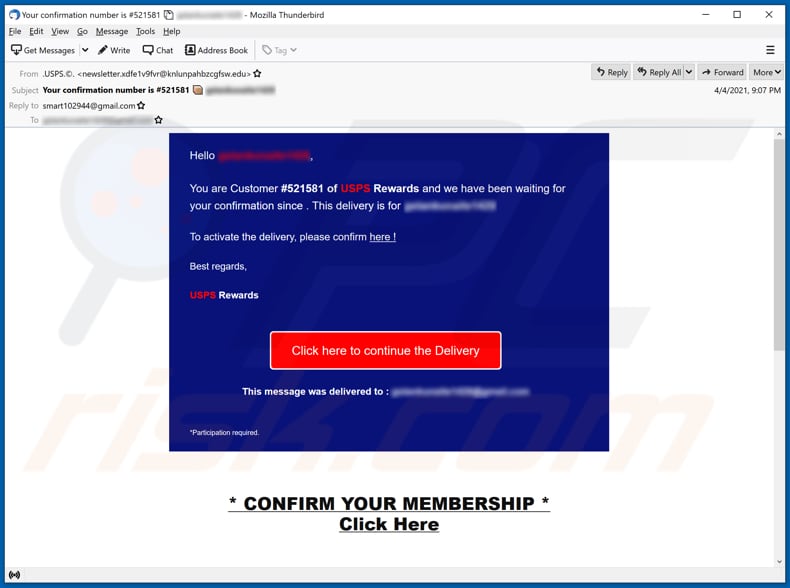
Text in this email:
Subject: Your confirmation number is #521581
Hello ********,
You are Customer #521581 of USPS Rewards and we have been waiting for your confirmation since . This delivery is for ********
To activate the delivery, please confirm here !
Best regards,
USPS Rewards
Click here to continue the Delivery
This message was delivered to : ********
*Participation required.
* CONFIRM YOUR MEMBERSHIP *
Click Here
The appearance of USPS Rewards scam website (GIF):
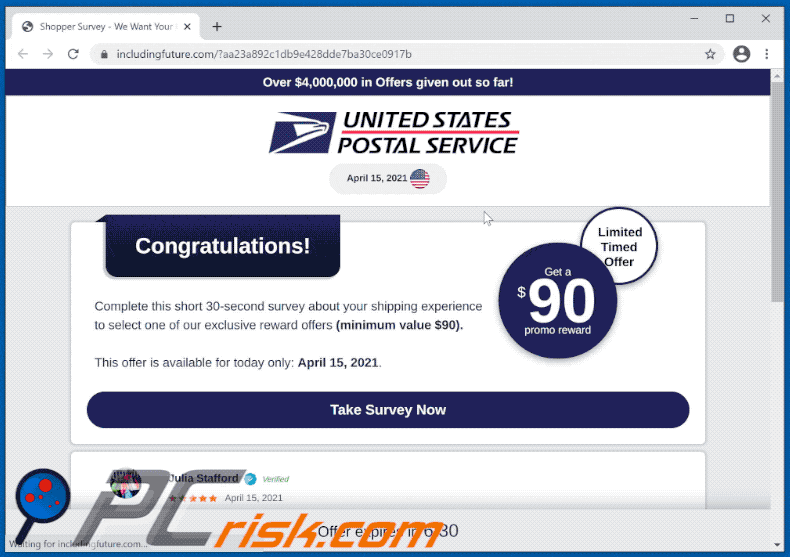
Text in this page:
Over $4,000,000 in Offers given out so far!
Congratulations!
Complete this short 30-second survey about your shipping experience to select one of our exclusive reward offers (minimum value $90).This offer is available for today only: April 15, 2021.
Take Survey Now
Screenshots of websites that the fake USPS website promotes to trick visitors into entering their information:
Instant automatic malware removal:
Manual threat removal might be a lengthy and complicated process that requires advanced IT skills. Combo Cleaner is a professional automatic malware removal tool that is recommended to get rid of malware. Download it by clicking the button below:
DOWNLOAD Combo CleanerBy downloading any software listed on this website you agree to our Privacy Policy and Terms of Use. To use full-featured product, you have to purchase a license for Combo Cleaner. 7 days free trial available. Combo Cleaner is owned and operated by RCS LT, the parent company of PCRisk.com.
Quick menu:
- What is USPS Rewards delivery confirmation scam?
- How to identify a pop-up scam?
- How do pop-up scams work?
- How to remove fake pop-ups?
- How to prevent fake pop-ups?
- What to do if you fell for a pop-up scam?
How to identify a pop-up scam?
Pop-up windows with various fake messages are a common type of lures cybercriminals use. They collect sensitive personal data, trick Internet users into calling fake tech support numbers, subscribe to useless online services, invest in shady cryptocurrency schemes, etc.
While in the majority of cases these pop-ups don't infect users' devices with malware, they can cause direct monetary loss or could result in identity theft.
Cybercriminals strive to create their rogue pop-up windows to look trustworthy, however, scams typically have the following characteristics:
- Spelling mistakes and non-professional images - Closely inspect the information displayed in a pop-up. Spelling mistakes and unprofessional images could be a sign of a scam.
- Sense of urgency - Countdown timer with a couple of minutes on it, asking you to enter your personal information or subscribe to some online service.
- Statements that you won something - If you haven't participated in a lottery, online competition, etc., and you see a pop-up window stating that you won.
- Computer or mobile device scan - A pop-up window that scans your device and informs of detected issues - is undoubtedly a scam; webpages cannot perform such actions.
- Exclusivity - Pop-up windows stating that only you are given secret access to a financial scheme that can quickly make you rich.
Example of a pop-up scam:

How do pop-up scams work?
Cybercriminals and deceptive marketers usually use various advertising networks, search engine poisoning techniques, and shady websites to generate traffic to their pop-ups. Users land on their online lures after clicking on fake download buttons, using a torrent website, or simply clicking on an Internet search engine result.
Based on users' location and device information, they are presented with a scam pop-up. Lures presented in such pop-ups range from get-rich-quick schemes to fake virus scans.
How to remove fake pop-ups?
In most cases, pop-up scams do not infect users' devices with malware. If you encountered a scam pop-up, simply closing it should be enough. In some cases scam, pop-ups may be hard to close; in such cases - close your Internet browser and restart it.
In extremely rare cases, you might need to reset your Internet browser. For this, use our instructions explaining how to reset Internet browser settings.
How to prevent fake pop-ups?
To prevent seeing pop-up scams, you should visit only reputable websites. Torrent, Crack, free online movie streaming, YouTube video download, and other websites of similar reputation commonly redirect Internet users to pop-up scams.
To minimize the risk of encountering pop-up scams, you should keep your Internet browsers up-to-date and use reputable anti-malware application. For this purpose, we recommend Combo Cleaner Antivirus for Windows.
What to do if you fell for a pop-up scam?
This depends on the type of scam that you fell for. Most commonly, pop-up scams try to trick users into sending money, giving away personal information, or giving access to one's device.
- If you sent money to scammers: You should contact your financial institution and explain that you were scammed. If informed promptly, there's a chance to get your money back.
- If you gave away your personal information: You should change your passwords and enable two-factor authentication in all online services that you use. Visit Federal Trade Commission to report identity theft and get personalized recovery steps.
- If you let scammers connect to your device: You should scan your computer with reputable anti-malware (we recommend Combo Cleaner Antivirus for Windows) - cyber criminals could have planted trojans, keyloggers, and other malware, don't use your computer until removing possible threats.
- Help other Internet users: report Internet scams to Federal Trade Commission.
Frequently Asked Questions (FAQ)
What is a pop-up scam?
Pop-up scams are deceptive messages intended to trick users into performing specific actions, such as: disclosing private data, making monetary transactions, downloading/installing software, purchasing products, etc.
What is the purpose of a pop-up scam?
Pop-up scams aim to generate revenue for the scammers behind them. The cyber criminals can profit by acquiring funds via deception, abusing or selling private data, promoting content (e.g., apps, extensions, products, services, etc.), proliferating malware, and so forth.
I have provided my personal information when tricked by a scam, what should I do?
If you have provided account credentials - change the passwords of all potentially exposed accounts and inform their official support without delay. And if you have disclosed other private data (e.g., ID card details, credit card numbers, etc.) - immediately contact the appropriate authorities.
Why do I encounter fake pop-ups?
Pop-up scams are promoted on deceptive websites, which are rarely visited intentionally. Most users access such sites through redirects caused by webpages using rogue advertising networks, intrusive ads, mistyped URLs, spam browser notifications, or installed adware.
Will Combo Cleaner protect me from pop-up scams?
Combo Cleaner is designed to scan every single site you visit and detect rogue, scam, and malicious ones. Therefore, if you enter such a webpage - you will be warned immediately, and further access to it will be blocked.
Share:

Tomas Meskauskas
Expert security researcher, professional malware analyst
I am passionate about computer security and technology. I have an experience of over 10 years working in various companies related to computer technical issue solving and Internet security. I have been working as an author and editor for pcrisk.com since 2010. Follow me on Twitter and LinkedIn to stay informed about the latest online security threats.
PCrisk security portal is brought by a company RCS LT.
Joined forces of security researchers help educate computer users about the latest online security threats. More information about the company RCS LT.
Our malware removal guides are free. However, if you want to support us you can send us a donation.
DonatePCrisk security portal is brought by a company RCS LT.
Joined forces of security researchers help educate computer users about the latest online security threats. More information about the company RCS LT.
Our malware removal guides are free. However, if you want to support us you can send us a donation.
Donate



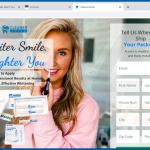
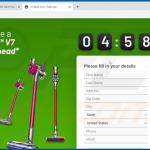
▼ Show Discussion